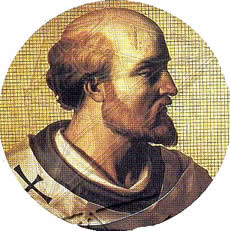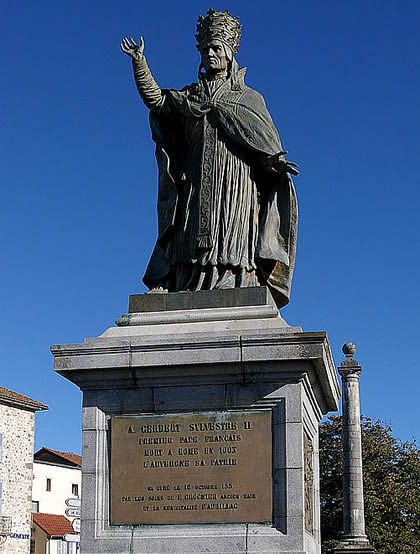World History
As a young man, Gerbert of Aurellac became a monk in Gaul and later studied in Spain at Barcelona, and under Islamic teachers at Seville and Córdoba. He was particularly skilled in the natural sciences and arithmetic.
After completing his education under Bishop Hatto of Vichy, he traveled with the bishop to Rome and won the support of Pope John XIII. Upon a recommendation of the pope, Emperor Otto I sent Gerbert to Reims, where he was given a position as an instructor in the cathedral school under Archdeacon Gerannus.
He was highly skilled in oratory and debated Ortricus of Magdeburg before Emperor Otto II on many theological matters. He was bestowed the abbey of Bobbio by the emperor but returned instead to Reims. He was partially responsible for the rise of Hugh Capet.
Gerbert was elected archbishop of Reims in 991 by a synod of bishops. This elevation to the See of Reims was later declared invalid. Gerbert argued against the primacy of the pope in settling disputes of ecclesiastical office.
Not being able to counteract this decision Gerbert chose another path and went to the court of Otto II, where he became the emperor’s teacher. Gerbert accompanied Otto to Italy and in 998 Pope Gregory V appointed him archbishop of Ravenna.
Shortly thereafter, the pope died and Gerbert was elected to the Chair of Peter on February 18, 999, and took the name of Sylvester, becoming the first pope from France. He reigned until his death in 1003.
Sylvester’s greatest accomplishment as pope was to fight the abuses of the bishops in regard to simony and concubinage. He argued vehemently that all men who rose to the episcopate should be innocent of sin.
He became friends with Emperor Otto III and was exiled with the emperor after a Roman revolt against the politics of the emperor. He remained in exile for years.
Abandoning his previous beliefs that the pope could not settle ecclesiastical disputes, Sylvester declared his former opponent for the See at Reims, Arnulph, as the rightful archbishop. His reputation suffered some criticism from historians for this change in policy.
After the death of Emperor Otto III, Sylvester returned to Rome, though he gained no temporal power from the competing factions of the city. He established metropolitanates in Poland and Hungary and declared the ruler of Hungary to be a king and papal representative.
Sylvester wrote many works on mathematics and the physical sciences. The people of Rome held him in high esteem as an exorcisor of the devil and a miracle worker. Some historians claim he introduced Arabic numbers into the West and was the inventor of the pendulum clock.
- Henry Iv - King Of Germany
Henry IV - King of Germany Henry IV was the eldest son of Henry III of Germany, from the Salian (Frankish) dynasty, and Agnes de Poitou, the daughter of William V of Aquitaine. He was born in 1050 and at the age of three was elected by the German assembly...
- Pope Innocent Iii
Pope Innocent III Innocent III was born into the noble family of Scotti and named Lothar. Aided by his familial ties to Pope Clement III, Innocent rose rapidly through the curia. The popular debate regarding the pontificate of Innocent III can best be...
- Pope Nicholas I
Pope Nicholas INicholas I was the second pope known as “the Great†(the first was Leo the Great). Nicholas was the son of a Roman nobleman and received a classical education as a youth. He entered the clerical service as a young man and was...
- Papal States
Papal States The Papal States were originally private property, owned and controlled by the popes in Rome. After the eighth century the term was applied to the duchy of Rome and surrounding feudal estates. Constantine the Great, the first Holy Roman...
- Concordat Of Worms
Holy Roman Emperor entered into an agreement with Pope Calistus II A concordat is a formal agreement between the pope acting in his spiritual function and a state. It is a legal contract between church and state, recognized as a treaty under international...
World History
Pope Sylvester II
 |
| Pope Sylvester II |
After completing his education under Bishop Hatto of Vichy, he traveled with the bishop to Rome and won the support of Pope John XIII. Upon a recommendation of the pope, Emperor Otto I sent Gerbert to Reims, where he was given a position as an instructor in the cathedral school under Archdeacon Gerannus.
He was highly skilled in oratory and debated Ortricus of Magdeburg before Emperor Otto II on many theological matters. He was bestowed the abbey of Bobbio by the emperor but returned instead to Reims. He was partially responsible for the rise of Hugh Capet.
Gerbert was elected archbishop of Reims in 991 by a synod of bishops. This elevation to the See of Reims was later declared invalid. Gerbert argued against the primacy of the pope in settling disputes of ecclesiastical office.
  |   |
Not being able to counteract this decision Gerbert chose another path and went to the court of Otto II, where he became the emperor’s teacher. Gerbert accompanied Otto to Italy and in 998 Pope Gregory V appointed him archbishop of Ravenna.
Shortly thereafter, the pope died and Gerbert was elected to the Chair of Peter on February 18, 999, and took the name of Sylvester, becoming the first pope from France. He reigned until his death in 1003.
Sylvester’s greatest accomplishment as pope was to fight the abuses of the bishops in regard to simony and concubinage. He argued vehemently that all men who rose to the episcopate should be innocent of sin.
 |
| Sylvester II statue |
He became friends with Emperor Otto III and was exiled with the emperor after a Roman revolt against the politics of the emperor. He remained in exile for years.
Abandoning his previous beliefs that the pope could not settle ecclesiastical disputes, Sylvester declared his former opponent for the See at Reims, Arnulph, as the rightful archbishop. His reputation suffered some criticism from historians for this change in policy.
After the death of Emperor Otto III, Sylvester returned to Rome, though he gained no temporal power from the competing factions of the city. He established metropolitanates in Poland and Hungary and declared the ruler of Hungary to be a king and papal representative.
Sylvester wrote many works on mathematics and the physical sciences. The people of Rome held him in high esteem as an exorcisor of the devil and a miracle worker. Some historians claim he introduced Arabic numbers into the West and was the inventor of the pendulum clock.
- Henry Iv - King Of Germany
Henry IV - King of Germany Henry IV was the eldest son of Henry III of Germany, from the Salian (Frankish) dynasty, and Agnes de Poitou, the daughter of William V of Aquitaine. He was born in 1050 and at the age of three was elected by the German assembly...
- Pope Innocent Iii
Pope Innocent III Innocent III was born into the noble family of Scotti and named Lothar. Aided by his familial ties to Pope Clement III, Innocent rose rapidly through the curia. The popular debate regarding the pontificate of Innocent III can best be...
- Pope Nicholas I
Pope Nicholas INicholas I was the second pope known as “the Great†(the first was Leo the Great). Nicholas was the son of a Roman nobleman and received a classical education as a youth. He entered the clerical service as a young man and was...
- Papal States
Papal States The Papal States were originally private property, owned and controlled by the popes in Rome. After the eighth century the term was applied to the duchy of Rome and surrounding feudal estates. Constantine the Great, the first Holy Roman...
- Concordat Of Worms
Holy Roman Emperor entered into an agreement with Pope Calistus II A concordat is a formal agreement between the pope acting in his spiritual function and a state. It is a legal contract between church and state, recognized as a treaty under international...
